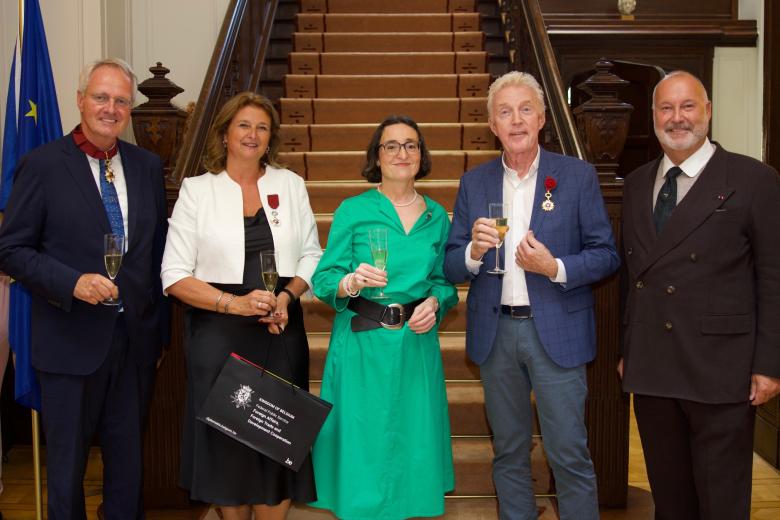The human side of the energy transition.
Climate change is considered an existential threat to humanity. While there are significant implications for the natural world from climate change, like biodiversity loss, threatened species and ocean acidification, the planet will likely adapt and survive to the human-induced damages and climatic changes we are observing. As demonstrated by the ‘rewilding’ of the long-desolate landscapes where the Chernobyl nuclear disaster took place in 1986. The flourishing return of wildlife to the Chernobyl site is just one example to show that the planet can adapt and survive in even the most extreme conditions, but the same may not be true for humans.

There is a general agreement that to maintain a safe and livable planet, we should not exceed 1.5 degrees Celsius of global warming above pre-industrial levels. However, even with the current climate policies in place around the world, we may still be on track to reach 2.7 degrees Celsius above pre-industrial levels by the turn of the century. This is largely due to our reliance on energy sourced primarily by fossil fuels for advancing human development. Society therefore finds itself in an interesting conundrum, where in a quest to improve living standards and quality of life, we are developing ourselves toward potential extinction.
When put that simply, that we as society are largely responsible for our own potential extinction, one can’t help but wonder how we can know all that we do and continue to make choices that lead us down a path toward self-destruction. For a long time, the explanation for this was a simple one - we didn’t know the reality of the situation. This could be viewed either as a result of not having enough information to spark public concern – known as the information deficit model, or people in powerful positions who benefit from our unsustainable ways suppressing information about the severity and likelihood of climate change and the role of fossil fuels in contributing to it. For example, the recent reports that show Exxon Mobil had conducted their own research on climate change decades ago and rather than act on it, instead funded research that would intentionally mislead and create uncertainty around the climate science that they knew to be true. Whilst power imbalances and traditional value structures of prioritizing profits still exist today as a key challenge for responding to climate change, society has also experienced a shift in thinking where climate change is now gaining the attention and urgency that it deserves. This is evident in the increased calls for action by civil society, governments, and corporations.
Civil society groups like ‘Fridays for Future’, ‘Extinction Rebellion’, and ‘Just Stop Oil’ have propelled climate change onto our TV’s and smartphones with their, often controversial, demonstrations. Whether one agrees with the group’s tactics or not, their actions have increased global public engagement and debate over climate change. At the same time, there has been an ever-increasing stream of news headlines and images that show the catastrophic impacts of climate change around the world. For example, the devastating floods across Pakistan that showed millions of people losing their homes, livelihoods and loved ones, or the severe drought across parts of Europe whereby dried up rivers and dams exposed ancient artefacts. All of which paint a clear picture of climate emergency and capture the attention of global populations, who in turn place mounting pressure on governments and corporations to act. In response, there have been increasingly bold commitments to act on climate change, with some of the biggest and most influential governments and corporations committing to net zero carbon emissions by 2050, if not earlier.
While these net zero commitments are incredibly positive to see, fears remain that we will not meet the moment and find meaningful solutions to climate change in the needed timeframe. Because despite all we know, progress toward climate change remains slow. This signals the complexity of undergoing sustainability transitions and suggests that it takes more than just a desire to act to find meaningful solutions to complex sustainability issues.
To strengthen understanding of how sustainability transitions play out within and across organizations, my recently defended PhD dissertation (woohoo!) set out to answer the broad question of ‘how do organizations and individuals understand and respond to climate change?’. To unpack this research question I conducted four studies, made up of one review study and three empirical studies. The review study built the foundations of my research by exploring cross-disciplinary literature on learning for sustainability challenges more broadly. Building on the insights gained in the review study, I narrowed my research focus for the three empirical studies to the individuals and organizations contributing to the European energy transition. Given that the very nature of the energy transition is to limit climate change, it provided an ideal context to explore my research question and sub-questions. By analyzing ten European energy companies’ corporate sustainability and climate reports over a 10-year period, and conducting interviews with 34 diverse actors contributing to the European energy transition, I was able to gain an in-depth understanding of how individuals and organizations make sense of climate change and how to respond to it, how people working in the energy transition justify climate inaction, and the impact radical organizational change (as a result of moving from fossil fuels to renewables) can have on individuals working in organizations responding to climate change.
Two clear themes arose from my research. First, the individuals and organizations included in my studies are understanding climate change through the lens of their many and diverse stakeholders. My research showed the various factors that companies must consider when planning their sustainability and climate responses. For example, the needs of the communities where they operate, their impact on the natural environment, the needs of their shareholders and investors, mounting pressure from civil society groups, and growing government regulation. My research also showed that the way an organization chooses to respond to climate change will have implications for their employees – another key stakeholder group. For example, organizational strategies that move away from an individual’s traditional area of expertise and skill may create feelings of discomfort, insecurity, and fear. Overall, my findings show that managing multiple and conflicting stakeholder demands makes it particularly challenging for decision-makers to make clear choices in how they will respond to climate change, as any decision will ultimately result in trade-offs between different stakeholders.
This brings me to the second theme that arose from my research, which is that in light of the increasingly complex stakeholder pressures individuals and organizations in the energy transition face, the most common response to climate change is to continue with business-as-usual responses that do not challenge the unsustainable systems and structures that contribute to the climate emergency. My findings showed that across both business research and practice, there was a tendency to prioritize firm performance outcomes over sustainability outcomes. Whilst some companies were striving for more transparency around their activities, most companies also considered acting on climate change as important primarily for avoiding financial risk or capitalizing on new financial opportunities. Finally, many of those contributing to the energy transition justified climate inaction by shifting responsibility and blame to others and using trade-offs to avoid decision making. The result of which, was a continuation of business-as-usual responses to climate change.
Climate change is considered a wicked problem as there are multiple ways that the problem can be understood, it requires many perspectives to solve, yet no one actor or groups feels entirely responsible for it, and all solutions come with inevitable trade-offs and unintended consequences. As shown above, these wicked characteristics presented consistently throughout the findings of my research. This suggests that while three out of my four studies focused specifically on the energy transition and climate change, insights from my findings will be transferrable to other kinds of wicked problems too, for ex-ample the refugee crisis, food insecurity and global poverty. Much like climate change, each of these wicked problems cross country and regulatory boundaries and therefore require input and action from multiple stakeholders, as well as require individual actors and organizations to consider the needs of multiple stakeholders and to make difficult trade-offs between those stakeholders. As shown by the two themes above, these were common challenges faced by the individuals and organizations examined throughout my research. It is therefore hoped that the relevance of my research stretches beyond just the issues of climate change and to the many complex and wicked problems that society is faced with today.
Also read
-
Green light for UM participation in unique YUFE bachelor programme
The UM can start as a degree awarding partner in the new unique bachelor programme Urban Sustainability Studies offered by YUFE (Young Universities for the Future of Europe), an alliance of ten European universities. This week, the UM received a positive outcome of the macro due diligence assessment...

-
Professor Anouk Bollen-Vandenboorn appointed Knight in the Order of the Crown
Prof. Dr Anouk Bollen-Vandenboorn, Director of the Institute for Transnational and Euregional cross border cooperation and Mobility (ITEM) at the Faculty of Law, Maastricht University, was appointed Knight in the Order of the Crown on 3 July, during a formal ceremony at the Belgian Embassy in The...

-
Study Smart gets Dutch Education Premium
Maastricht University's (UM) interfaculty educational innovation project Study Smart is one of the three winners of the Dutch Education Premium 2025. This was announced on Tuesday during the Comenius festival in The Hague.
